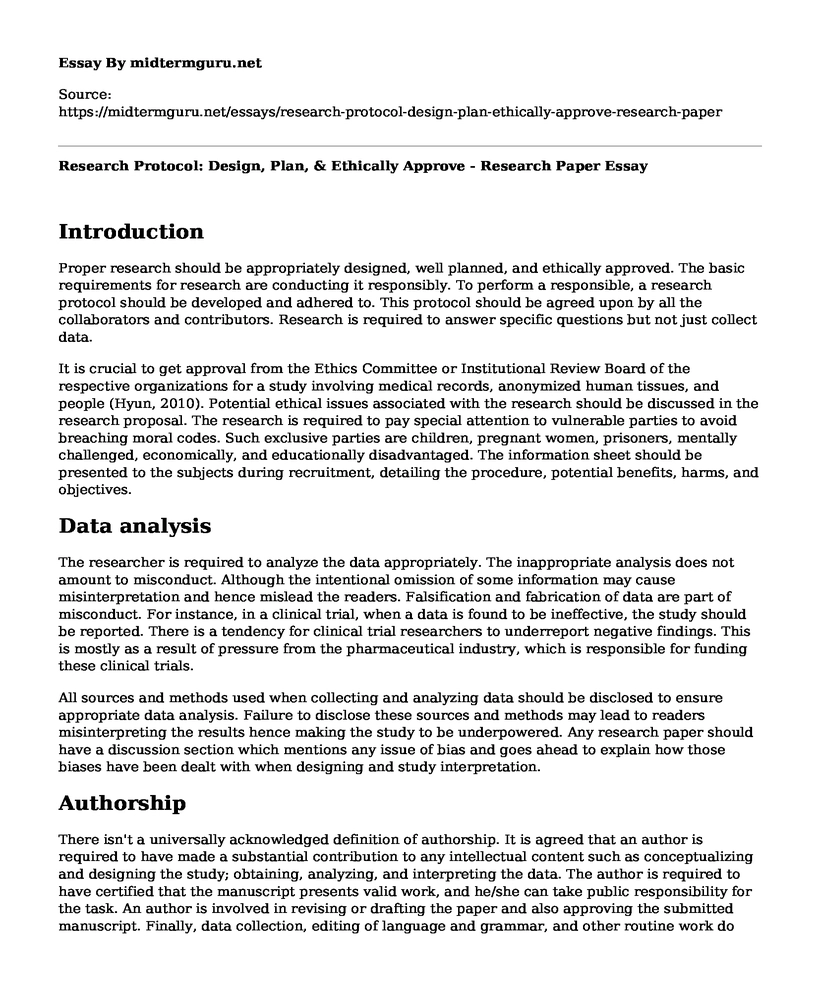Introduction
Proper research should be appropriately designed, well planned, and ethically approved. The basic requirements for research are conducting it responsibly. To perform a responsible, a research protocol should be developed and adhered to. This protocol should be agreed upon by all the collaborators and contributors. Research is required to answer specific questions but not just collect data.
It is crucial to get approval from the Ethics Committee or Institutional Review Board of the respective organizations for a study involving medical records, anonymized human tissues, and people (Hyun, 2010). Potential ethical issues associated with the research should be discussed in the research proposal. The research is required to pay special attention to vulnerable parties to avoid breaching moral codes. Such exclusive parties are children, pregnant women, prisoners, mentally challenged, economically, and educationally disadvantaged. The information sheet should be presented to the subjects during recruitment, detailing the procedure, potential benefits, harms, and objectives.
Data analysis
The researcher is required to analyze the data appropriately. The inappropriate analysis does not amount to misconduct. Although the intentional omission of some information may cause misinterpretation and hence mislead the readers. Falsification and fabrication of data are part of misconduct. For instance, in a clinical trial, when a data is found to be ineffective, the study should be reported. There is a tendency for clinical trial researchers to underreport negative findings. This is mostly as a result of pressure from the pharmaceutical industry, which is responsible for funding these clinical trials.
All sources and methods used when collecting and analyzing data should be disclosed to ensure appropriate data analysis. Failure to disclose these sources and methods may lead to readers misinterpreting the results hence making the study to be underpowered. Any research paper should have a discussion section which mentions any issue of bias and goes ahead to explain how those biases have been dealt with when designing and study interpretation.
Authorship
There isn't a universally acknowledged definition of authorship. It is agreed that an author is required to have made a substantial contribution to any intellectual content such as conceptualizing and designing the study; obtaining, analyzing, and interpreting the data. The author is required to have certified that the manuscript presents valid work, and he/she can take public responsibility for the task. An author is involved in revising or drafting the paper and also approving the submitted manuscript. Finally, data collection, editing of language and grammar, and other routine work do not require authorship.
It is essential to decide early on in the research planning; who will be the authors, contributors, and who will be acknowledged. It is advisable to carefully read the "Advice to Authors" which may serve as a guide on the matters of authorship.
Conscience Clause
Conscience clause is a legislative provision relieving a person from compliance on religious grounds (Ashcroft, Dawson, & McMillan, 2007). It allows physicians, pharmacists, and other health care providers not to give certain medical services for conscience or religious reasons. There are several importance of the conscience clause. Some of this importance are:
- Allows a health practitioner to refuse to be involved in the killing of a person.
- Allows a health care provider to refuse to perform abortion procedure.
- Conscience clause allows an individual not to engage in embryonic stem cell research.
- Allows a physician to refuse to provide a treatment that is based on research which involved embryonic stem cells.
- It allows the doctor/nurse to refuse to provide any information that permits physician-assisted suicide.
Healthcare workers and facilities should have the ability to refuse to perform specific procedures based on religious or moral objectives (Ashcroft, Dawson, & McMillan, 2007). This is because if those health workers perform specific procedures, they may cause a lot of religious and conscious problem. However, Providers with religious and moral objections should ensure referral processes are in place and done on time so that the patient can access the services that the healthcare worker and the facility do not wish to provide.
References
Ashcroft, R. E., Dawson, & McMillan, J. (Eds.). (2007). Principles of health care ethics. John Wiley & Sons.
Hyun, I. (2010). The bioethics of stem cell research and therapy. The Journal of clinical investigation, 120(1), 71-75.
Cite this page
Research Protocol: Design, Plan, & Ethically Approve - Research Paper. (2023, Feb 02). Retrieved from https://midtermguru.com/essays/research-protocol-design-plan-ethically-approve-research-paper
If you are the original author of this essay and no longer wish to have it published on the midtermguru.com website, please click below to request its removal:
- Essay on Nursing Evidence-Based Practice: Weighing the Evidence
- Statistics in Business - Paper Example
- Essay Sample on Communicating and Leading at Work
- Understanding Internal vs. External Evidence in Nursing - Research Paper
- Leadership in Organizations: How to Guide and Inspire - Essay Sample
- Drug Abuse & Overdose Death Rates Rise in US - Essay Sample
- Memory Biases: How Cognitive Bias Impacts Decision Making - Essay Sample







